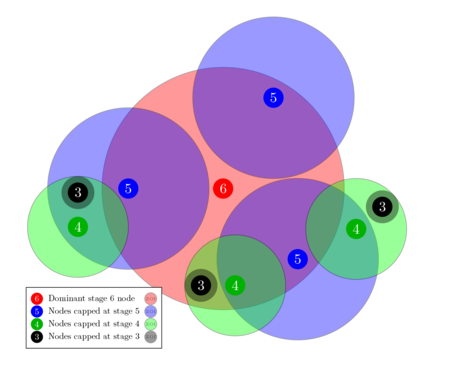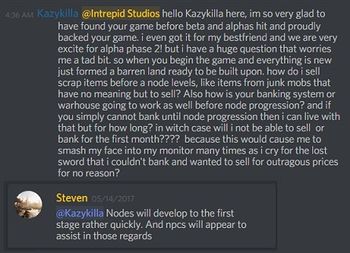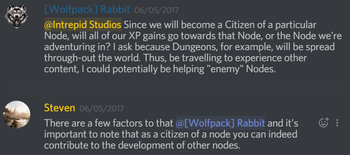Template:Node advancement
Nodes advance by collecting experience from the actions of players nearby. As players complete content inside of a Node’s Zone of Influence (the area around the node), they contribute that experience toward the Node’s development. The experience given to the Node may then be modified based on certain Events and Accomplishments. When a Node reaches the experience required, it undergoes the process of advancing to the next stage. There are a few exceptions where a Node cannot advance even though it has the required experience - most commonly, a Node can not advance if a Node is a Vassal of another Node and would advance to the same stage as its Parent Node.[1] – Margaret Krohn
Citizen and non-citizen player activity (questing, gathering, raiding, etc.) within a node's ZOI counts toward that particular node’s advancement (progression).[2] Nodes have seven (7) stages of advancement, with experience thresholds for each stage. When a Node reaches the experience required for its current stage, it advances to the next stage.[3]
| Node stage.[2] | Alternate name.[4] | Timeframe to advance.[2] | Player housing.[5] | |
|---|---|---|---|---|
| 0. | Wilderness | - | ||
| 1. | Expedition | Crossroads | Few hours | - |
| 2. | Encampment | Camp | Many hours | - |
| 3. | Village | - | Few days | Freeholds, Static housing |
| 4. | Town | - | Many days | Freeholds, Static housing, Apartments |
| 5. | City | - | Few weeks | Freeholds, Static housing, Apartments |
| 6. | Metropolis | Metro | Many weeks | Freeholds, Static housing, Apartments |
The Development Area of a Node is where civilization will appear as the Node advances. As the Node Stage increases, different buildings, NPCs, and services will become available in the Development Area. The higher the Node Stage, the more complex and populated the Development Area becomes. Development Areas will also vary depending on the Node Type - Economic, Military, Scientific, or Divine; we’ll go into further details on each of those Node Types in future posts in this series.[1] – Margaret Krohn

Beginning at Node Stage 3, when a Node advances, it enslaves nearby Nodes and makes them into its Vassals. Vassal Nodes are owned by a Parent Node and must always be at least one Node Stage below the Parent Node. This means that the Vassal Node cannot grow until the Parent Node advances in stage. Vassal Nodes give excess experience to their Parent Node, and are able to have their own Vassals, as long as they fit within the Parent Node’s Zone of Influence. They are subject to the government, alliances, wars, taxes, and trade of their Parent Node, and are able to receive federal aid from them. A Vassal Node cannot declare war on their Parent Node or any of its Vassals. Citizens of Vassals are bound by the diplomatic states of the Parent Node.[3] – Margaret Krohn
The advancement of a node unlocks its unique content, which comes at the cost of locking out an increasing ring of neighboring nodes from progressing to the next stage.[7]
- Nodes advance to the first stage quickly. This enables NPC services such as vending or banking items.[8]
- The more advanced the node is, the larger its ZOI becomes.[5]
- Less advanced nodes (referred to as vassal nodes) that fall within a more advanced node's ZOI can still gain XP, but must remain at a lower advancement stage than the dominant node.[6]
- A node does not receive XP from the nodes within its ZOI until these nodes have reached their cap.[6]
- Players are moved to safety if they intersect with newly spawned assets during node advancement.[9]
- Citizens of one node can contribute to the advancement of other nodes.[10]
- The exact percentage of advancement from obtaining items or killing monsters is not going to be explicitly known to avoid "gaming" the system.[11]
Different people have different resources invested in nodes progressing and it would be a little "gamey" if you could know exactly what was necessary at that point because that would disincentivize people from participating.[11] – Steven Sharif
- ↑ 1.0 1.1 Blog - Know Your Nodes - Advance and Destroy.
- ↑ 2.0 2.1 2.2 A reactive world - Nodes.
- ↑ 3.0 3.1 Blog - Know Your Nodes - The Basics.
- ↑ Livestream, December 12, 2018 (14:48).
- ↑ 5.0 5.1 Node series part II – the Metropolis.
- ↑ 6.0 6.1 6.2 Livestream, October 16, 2017 (50:20).
- ↑ Video, April 20, 2017 (0:02).
- ↑

- ↑ Livestream, November 17, 2017 (55:27).
- ↑

- ↑ 11.0 11.1 Livestream, May 26, 2017 (28:16).